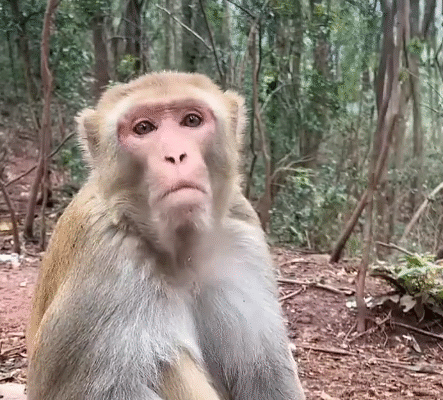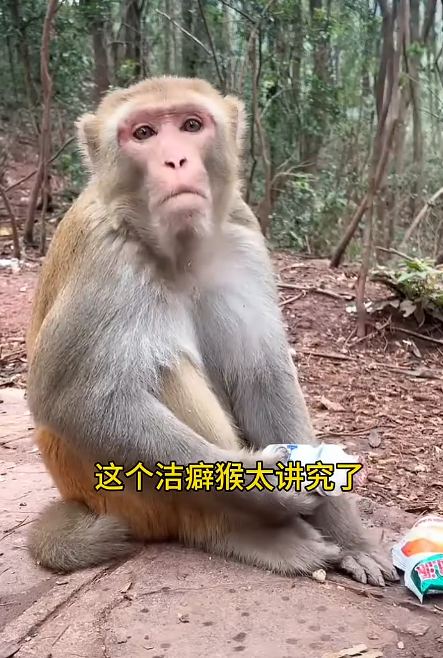
In a quiet little village, nestled between green hills and winding rivers, there lived a monkey unlike any other. While most monkeys swung freely through trees, rolled in the dirt, and snatched fruit with sticky fingers, this particular monkey had a strange quirk—he was a mysophobe. That is to say, he had a fear of dirt, germs, and anything unclean.
The villagers first noticed this when they would bring bananas to the edge of the forest. Ordinary monkeys would leap down, grab the fruit without hesitation, and often shove three bananas into their mouths at once. But this one sat apart. He would carefully inspect the banana peel before touching it, sniff the surface, and sometimes even wipe it on a large leaf before eating. If the fruit had even a speck of mud, he would throw it away with a disgusted squeal.
The children of the village called him “Clean Spirit Monkey” because of his unusual ways. Whenever they played near the river, they would laugh and tease:
“Look at him wash his hands again! He’s cleaner than us!”
Indeed, it was true. The monkey spent more time washing himself in the stream than eating or playing. He would rub his tiny hands together, splash his face, and groom his fur meticulously. The other monkeys of the forest thought he was ridiculous. They would roll in the dust, leap into mud puddles, and chase each other through the underbrush, only to find him perched on a high branch, glaring down at them with a look of pure disapproval.
“Why do you avoid the fun?” one of the monkeys asked him. “Mud is nothing! Dirt is our friend.”
But the mysophobic monkey shook his head vigorously. He had decided long ago that filth brought sickness, and sickness brought suffering. He had once seen an old monkey grow weak from an infected wound after rolling in the mud, and from that day on, he vowed never to allow germs to touch his body.
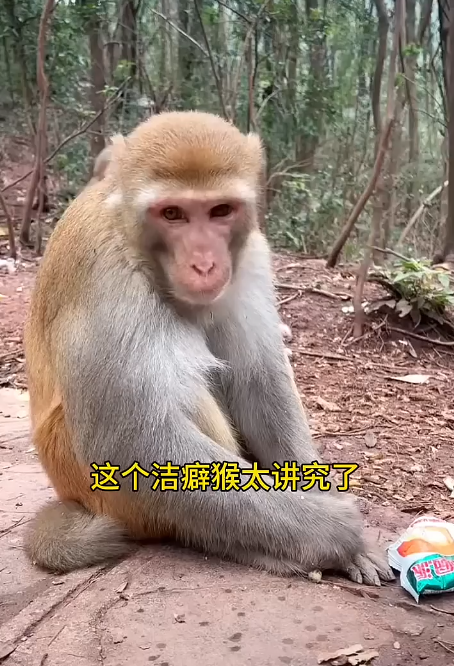
This odd behavior made him the subject of endless amusement. The villagers laughed whenever he tiptoed through the grass, avoiding patches of dirt like a nobleman avoiding puddles in silk shoes. They laughed even harder when he covered his mouth with his tiny hands whenever another monkey sneezed nearby.
Yet, for all the laughter, there was also a sense of mystery surrounding him. The village elders whispered that the monkey was not just an ordinary animal.
“Spirits often come back to guide us in strange forms,” one old woman said. “Perhaps this monkey is the spirit of someone who hated filth in their lifetime. Maybe he was a great sage who wanted cleanliness above all things.”
As the seasons changed, the monkey’s habits only became stranger. He began to imitate the villagers. Whenever he saw someone sweeping the yard, he would grab a stick and drag it across the ground as if cleaning too. When the women washed clothes at the river, he would splash water on stones, scrubbing furiously with his little hands. The funniest moment of all came when a farmer sneezed loudly—“Achoo!”—and the monkey instantly covered his mouth and nose with both hands, glaring at the farmer as though he had committed a crime. The villagers burst out laughing, calling him “The Spirit of Cleanliness.”
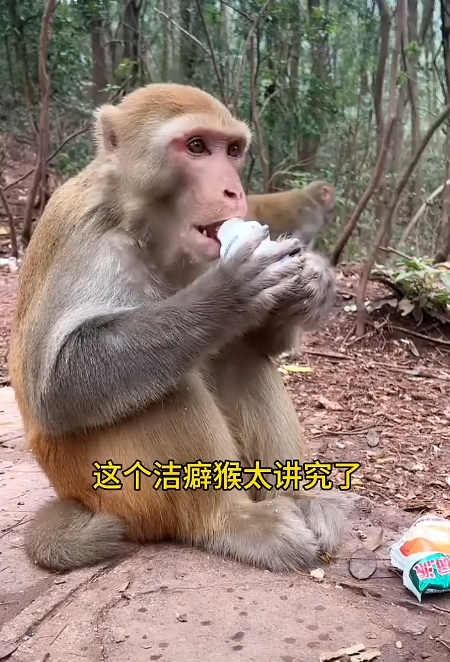
But despite his comical behavior, there was an eerie sense that he truly was more than just a monkey. Sometimes at night, he would sit still under the moonlight, his eyes glowing faintly as though touched by something beyond this world. Children whispered that he could see things humans could not—the invisible specks, the spirits of disease, drifting through the night air.
One fateful summer, sickness did come to the village. A strange fever spread quickly, leaving children weak and elders coughing in their sleep. The villagers feared it was a curse. Strangely, the mysophobic monkey never got sick. He kept his distance from the ill, washed himself even more obsessively, and seemed to sense danger before it arrived.
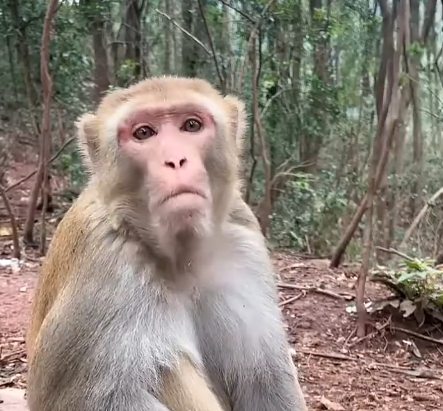
That was when people began to look at him with respect, not just laughter. They said he had become a protector spirit. The children still giggled at his silly ways, but now they also bowed their heads when he passed, whispering prayers that he would keep them safe.
What made the monkey truly legendary, however, was the day he saved the village well. One afternoon, as women came to draw water, the monkey shrieked loudly and began throwing stones into the bucket. At first, everyone thought he had gone mad. But then one of the men peered into the well and discovered a dead animal floating inside. If they had drunk the water, many might have fallen ill.
From that day on, the villagers said with certainty: “He is not just a monkey. He is a spirit sent to guard us.”
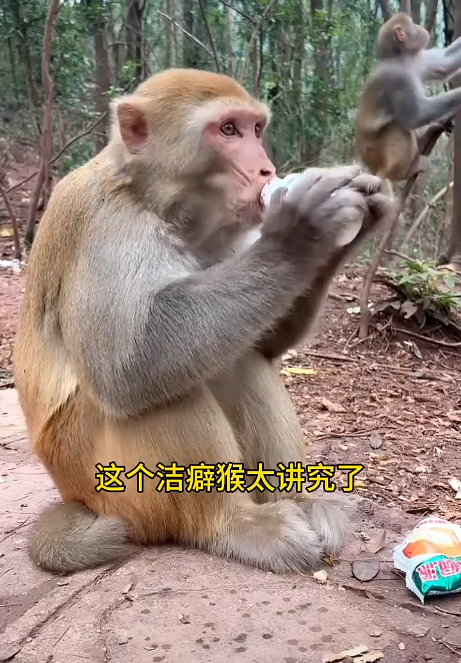
Even so, his mysophobia remained endlessly funny. He refused to eat anything unless it was peeled perfectly clean. If a child offered him sticky rice with sugar, he would sniff it, wrinkle his nose, and wave his hand as if to say, “Take that filth away.” If another monkey tried to wrestle him in play, he would leap back in horror, dusting himself off furiously. And the funniest sight of all was when he found a mud puddle blocking his path—he would either jump three times higher than usual to avoid it, or he would stop entirely and wait for hours until the sun dried it out.
Stories of the “Mysophobic Spirit Monkey” spread beyond the village. Travelers came to see him, amazed by his human-like behavior. Some laughed until their sides hurt; others bowed in respect, believing they were in the presence of a reincarnated monk.
As years went on, the monkey became almost mythical. When children misbehaved, parents would warn them:
“Wash your hands, or the Clean Spirit Monkey will scold you!”
When illness threatened, the villagers whispered prayers in his direction:
“Protect us, great spirit, keep the dirt-born sickness away.”
And yet, despite all the reverence, he remained as funny as ever. No one could watch him inspect his food, wipe it clean, and then eat with delicate little bites without bursting into laughter. He was a symbol of both comedy and mystery, a creature caught between the world of animals and the realm of spirits.
Some said that when he eventually vanished into the forest one autumn evening, he didn’t simply wander off. They believed he returned to the spirit world, satisfied that he had taught humans an important lesson: cleanliness, caution, and respect for the unseen forces of life.
To this day, the villagers still tell stories about him around their fires. Children giggle, imagining a monkey who hated dirt, while the elders nod solemnly, remembering the times he saved them from sickness. And in the quiet nights when the river reflects the moonlight, some say you can still hear him splashing in the water, washing his hands, forever clean, forever funny, and forever a spirit.
